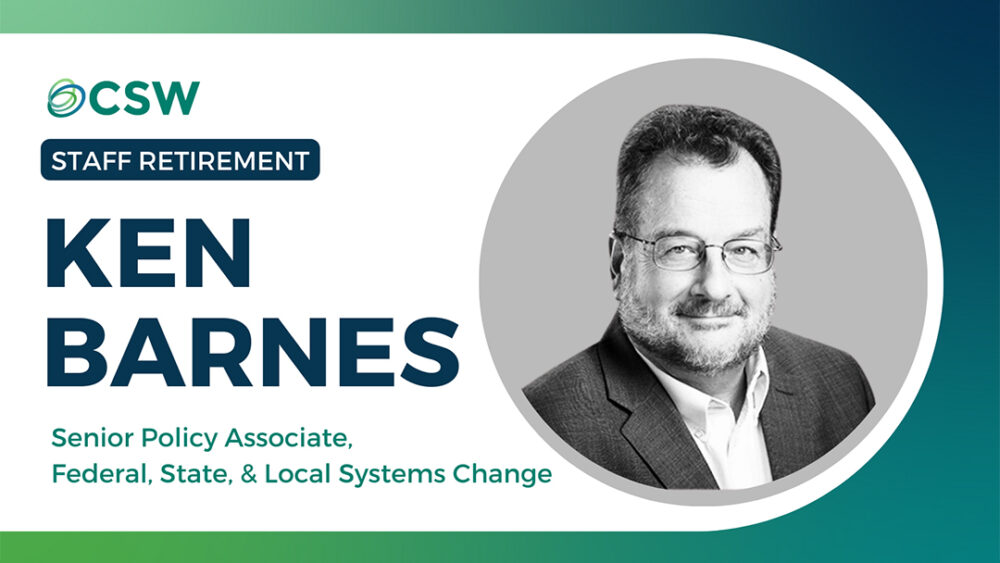After seven years of dedication to the work of CSW’s Federal, State, & Local Systems Change team, Senior Policy Associate, Ken Barnes, is entering retirement. Ken has spent his career working to achieve true improvements in job quality and creating equitable workforce opportunities for workers and learners across the U.S. Ken’s retirement is bittersweet, as he has been a core member of the CSW staff and an expert in the field. Reflecting on his time in workforce development and CSW, we asked Ken a few questions:
What roles were you in before CSW?
I worked for about ten years as a community organizer in various East Coast cities, and eventually got a job with the Boston Housing Authority, working with tenant organizations that had been contracted to recruit residents for education and training programs. I didn’t quite realize it at the time, but that was the start of my career in workforce development. In 1997 I became chief planner for the City of Boston’s Office of Workforce Development, and eventually was promoted to deputy director, a job I had for twelve years before moving to Michigan and connecting with CSW.
How did you come to join CSW?
My wife got a job in Michigan, so we moved there in 2014. A mutual colleague introduced me by email to Larry Good, who spent an hour on the phone with me, giving me the history of workforce development in Michigan as well as a list of people to talk to. A few months later, I bumped into Larry at a conference, and he told me CSW might have a small project for me to work on. When that project ended, I started working full-time for CSW, mostly in Detroit at first.
What kind of work did you do with CSW’s California projects?
I ended up moving to Los Angeles right around the time the California Workforce Development Board (CWDB) was looking for a third-party evaluation of their effort to promote regionalism among the state’s 45 local workforce boards. We ended up conducting a series of evaluations of that initiative over several years, as well as an evaluation of the state’s American Job Center system and a pilot program aimed at building partnerships between community-based organizations and local workforce boards. Over time, our role evolved from one of straight evaluation to something closer to technical assistance, helping the state figure out how to move regionalism forward in a way that local boards could embrace and make their own.
What kind of work did you do with CSW’s Federal projects?
Because I had some experience with apprenticeship in Boston, I ended up on the CSW team that worked with the National Governors’ Association to provide technical assistance to grantees under the US Department of Labor’s American Apprenticeship Initiative. Those grantees were often trying to introduce apprenticeship to industries that were not accustomed to it, so we helped them troubleshoot and devise new strategies for engaging employers. We ended up rewriting ‘The Federal Resources Playbook for Apprenticeship’ as part of that project.
What work are you most proud of?
Having tried to bring the values and the mind-set of community organizing into my workforce development career. In Boston, we built a strong local workforce system that relied heavily on community organizations in order to reach and serve those most in need of services. At CSW, we try to infuse those same principles in our work whenever possible.
What opportunities would you hope the FSL team could tackle next?
I’m excited about the fact that, across the country, more and more local workforce boards appear to be getting serious about equity. They don’t necessarily have the answers yet, but they’re starting to ask the hard questions: Are we reaching the people most in need of our services? When we do, are they achieving equitable employment outcomes? We’ve encouraged state workforce boards like CWDB to make equity the overarching theme for all of their initiatives. I’d like to see CSW supporting a national effort to ensure that the workforce development system is addressing equity and impacting poverty.
How do you plan to spend your retirement?
I’ll be spending more time with my grandchildren and exploring the Southwest.
All of the CSW team are saddened by Ken’s leaving but wish him the best as he enters retirement. President & CEO, Kysha Wright Frazier, stated: “It was truly a wonderful opportunity to have worked with Ken over the last seven years. Ken brought such a wealth of knowledge and experience to CSW that was balanced with his ability to relate to people that came from an array of regions, ages, and viewpoints. He brought wit, along with great passion and compassion- something that’s hard to find. I wish him all the best as he moves into retirement!”



Comments are closed.